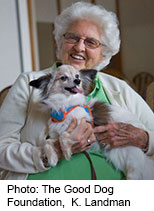- Could Your Grocery Store Meat Be Causing Recurring UTIs?
- Are You Making This Expensive Thermostat Error This Winter?
- Recognizing the Signs of Hypothyroidism
- 10 Strategies to Overcome Insomnia
- Could Artificial Sweeteners Be Aging the Brain Faster?
- Techniques for Soothing Your Nervous System
- Does the Water in Your House Smell Funny? Here’s Why
- Can a Daily Dose of Apple Cider Vinegar Actually Aid Weight Loss?
- 6 Health Beverages That Can Actually Spike Your Blood Sugar
- Treatment Options for Social Anxiety Disorder
Therapy Dogs Help Cancer Patients Cope With Tough Treatments


People undergoing chemotherapy and radiation for cancer may get an emotional lift from man’s best friend, a new study suggests.
The study, of patients with head and neck cancers, is among the first to scientifically test the effects of therapy dogs — trained and certified pooches brought in to ease human anxiety, whether it’s from trauma, injury or illness.
To dog lovers, it may be a no-brainer that canine companions bring comfort. And therapy dogs are already a fixture in some U.S. hospitals, as well as nursing homes, social service agencies, and other settings where people are in need.
Dogs offer something that even the best-intentioned human caregiver can’t quite match, said Rachel McPherson, executive director of the New York City-based Good Dog Foundation.
“They give unconditional love,” said McPherson, whose organization trains and certifies therapy dogs for more than 350 facilities in New York, New Jersey, Connecticut and Massachusetts.
“Dogs don’t judge you, or try to give you advice, or tell you their stories,” she pointed out.
Instead, McPherson said, therapy dogs offer simple comfort to people facing scary circumstances, such as cancer treatment. But while that sounds good, doctors and hospitals prefer scientific evidence.
“We can take for granted that supportive care for cancer patients, like a healthy diet, has benefits,” said Dr. Stewart Fleishman, the lead researcher on the new study. “We wanted to really test animal-assisted therapy and quantify the effects.”
Fleishman, now retired, was founding director of cancer supportive services at Beth Israel Medical Center in New York City — now called Mount Sinai Beth Israel.
For the new study, his team followed 42 patients at the hospital who were undergoing six weeks of chemotherapy and radiation for head and neck cancers, mostly affecting the mouth and throat.
All of the patients agreed to have visits with a therapy dog right before each of their treatment sessions. The dogs, trained by the Good Dog Foundation, were brought in to the waiting room, or hospital room, so patients could spend about 15 minutes with them.
The chemo/radiation regimen in this study was “intense,” Fleishman said.
“These patients get very sick,” he noted. “They can’t eat well, they have trouble speaking. The treatment becomes more of a burden than the cancer.”
But overall, the dogs seemed to make the burden a little easier. Using standard questionnaires, Fleishman’s team found that — as expected — patients’ physical well-being deteriorated over the course of their treatment.
Yet their emotional and “social” well-being — which includes feeling supported — actually increased.
“One patient said, ‘I would’ve stopped the treatment, but I wanted to come see the dog,'” Fleishman said.
The findings, published in the January issue of the Journal of Community and Supportive Oncology, might encourage more hospitals to consider a therapy dog program, Fleishman said.
The Good Dog Foundation has been around for 16 years, and McPherson said she’s witnessed plenty of evidence that the dogs help a wide range of people — including patients recovering from stroke, nursing home residents, children with autism, and disaster victims.
Still, McPherson said scientific evidence is vital, which is why her foundation partly funded the current study, and plans to be involved in more research.
The foundation finds their good dogs when interested owners volunteer. The dogs go through a screening process; no particular breed is better than others, McPherson said, but the dog does need the “right temperament.”
From there, training includes simulations of the settings where they’ll work: If the animals are going to visit hospitals, they have to get used to wheelchairs and IV poles, for instance, McPherson noted. They also have to master basic commands and get clearance from a vet.
“We have a strict protocol,” McPherson said.
“It takes time, effort and money for animal-assisted therapy to happen,” Fleishman said. And this study, he added, offers evidence that it’s all worth it.
When it comes to cancer treatment, the findings show that the rigors can be lessened, Fleishman said. “I think patients can take heart,” he said. “There are interventions that can make the quality of that time better.”
More information
The Good Dog Foundation has more on animal-assisted therapy.
Source: HealthDay
Copyright © 2026 HealthDay. All rights reserved.










